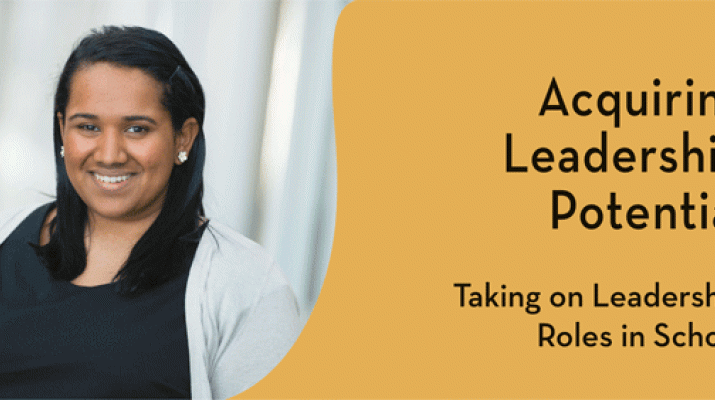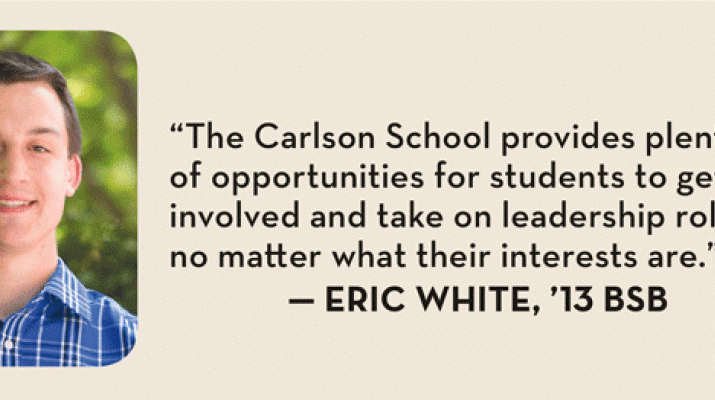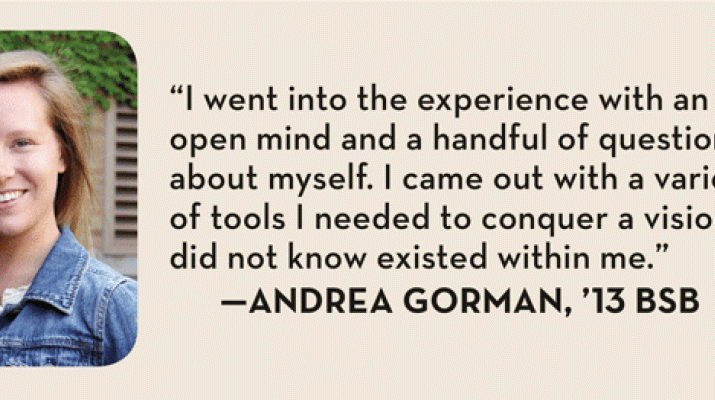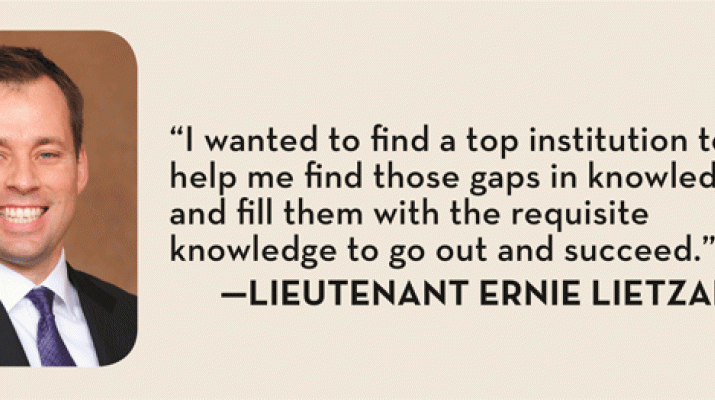
Acquiring Leadership Potential
Sunday, September 1, 2013
By Kevin Moe
The Carlson School offers myriad ways in which students can take on leadership roles. Besides finding these roles rewarding in themselves, students have gained valuable insights into the nature of leadership and plan to call on their new skills in their future endeavors.

I strongly believe that being a leader at the Carlson School is a harbinger of greater things to come.
Learning by Interacting
During her years at the Carlson School, Vallari Ajgaonkar, ’13 BSB, found herself holding many formal and informal leadership positions. She was president of the Business Association of Multicultural Students, a Peer Career Coach, an upper-class representative to the Business Board, a Carlson Crew Leader, and a Carlson Ambassador. She also was a community advisor in Middlebrook Hall (a student residence), a member of the Carlson National Traveling Case Competition, and was named Carlson Student of the Year when she was a junior.
“All of these positions and honors have helped me not just become a leader, but have completely transformed who I am today and who I want to be someday,” she says. “However, it would be remiss to say that everything I learned about being a leader I learned by being a leader. A child learns to speak by carefully observing his or her parents, and so I learned to lead by carefully observing the best instructors Carlson has to offer: peers, staff, and actual instructors.”
Ajgaonkar says being a Peer Career Coach (PCC) was one of the most enjoyable experiences of her college career. “Most outstanding leaders I have interacted with truly want to help others,” she says. “The PCC role allowed me to practice that aspect of leadership on a daily basis. I loved the ‘high’ I would feel when a student I had helped attained the internship he or she was after or received an offer, or simply walked a little taller because of the confidence I had helped cultivate.”
The most broadening experience of her college career was serving as president of the Business Association of Multicultural Students (BAM). BAM was given the Tony Diggs Award for Outstanding Undergraduate Student Organization in May 2012, a semester into Ajgaonkar’s presidential term. “One of the key reasons the selection committee chose us was because the structure and workload of our organization so similarly mimicked a professional environment,” she says. “Because of this design, my BAM experience gave me many experiences on a micro-scale that I’m sure I’ll experience again in the corporate world.”
A difficult question for Ajgaonkar to answer is what were the key takeaways of leadership she received from the Carlson School. “There’s a reason I can’t answer it,” she says. “There aren’t any ‘key takeaways’ from the leadership I learned. The takeaway is simply me. The leader I have become is what I will take away. Even though I make mistakes in leadership every single day, I still strive to be the best leader I can be.”
She will have plenty of opportunities to hone her leadership skills in the next three years, as she is a management trainee in the Unilever Future Leaders Program. Throughout it all, she will be guided by the multitude of leadership experiences she acquired at the Carlson School. “I strongly believe that being a leader at the Carlson School is a harbinger of greater things to come,” she says.

The Carlson School provides plenty of opportunities for students to get involved and take on leadership roles, no matter what their interests are.
Seizing Opportunities
Eric White, ’13 BSB, can name several reasons he attended the Carlson School. For one, he says he felt a level of authenticity that he didn’t find at other top business schools. Another reason was the sheer amount of choices and activities the school has to offer. “I knew if I seized the opportunities presented to me, I would have had the chance to study abroad, help lead a student-run organization, conduct research, and meet hundreds of great people—all before graduating,” he says. “The Carlson School provides plenty of opportunities for students to get involved and take on leadership roles, no matter what their interests are. All students, no matter their background, can find clubs, organizations, and activities that give them a chance to lead.”
White’s biggest leadership roles at the school included being a Student Ambassador, the coordinator for Business Week 2013, a teaching assistant for Finance 3001, and a competitor on one of the school’s case competition teams. “One way the Carlson School brought out my leadership skills was by surrounding me with other driven and curious students,” he says. “When you get a group of people together who are open-minded, collaborative, and high-achieving, it challenges everyone to be the best they can be.”
He was amply honored for his skills, graduating summa cum laude and winning both the Tomato Can Loving Cup Award and the Thomas E. Burnett, Jr. Leadership Award. The Tomato Can Award, presented to one undergraduate senior each year at commencement, is the most prestigious award offered by the Carlson School.
The Tom Burnett Award is presented to an individual in the Tom Burnett Leadership Program for his or her contributions to the group. The individual who receives the award is selected by his or her peers. “It meant so much to me that my peers found my contributions to our group and our discussions valuable, especially after they had taught me so much about myself and about leadership,” White says. “I learned more about leadership in the several weeks of the Tom Burnett Leadership Program than I had in any other single experience thus far in my life.”
White started working at Target Corporation in June in its finance and accounting development program. His work focuses primarily on financial forecasting, and he says he enjoys getting to apply many of the theories and concepts he learned at the Carlson School to solve problems in his new setting. “Some of the biggest things I’ve taken away from my time at the Carlson School are new levels of self-confidence and insight that come from challenging myself and a great group of friends who will help each other down the road,” he says. “I also feel I was challenged to create my own definition of success at school, which will serve me well in life.”

I went into the experience with an open mind and a handful of questions about myself. I came out with a variety of tools I needed to conquer a vision I did not know existed within me.
Leadership to Create Positive Change
Andrea Gorman, ’13 BSB, notes that the Carlson School offers a variety of leadership development opportunities—Enterprises, Carlson Crew, Ambassadors, and over 20 student organizations—but the one that had the most resonance for her was the school’s session of the LeaderShape Institute.
“LeaderShape cannot easily be described in words. It was a six-day, foundation-shaking leadership retreat that allowed me to learn more about who I was and how I was wired,” she says. “I went into the experience with an open mind and a handful of questions about myself. I came out with a variety of tools I needed to conquer a vision I did not know existed within me: to live in a world where everyone understood their gifts and natural talents—and felt valued for them.”
LeaderShape incorporates individual and group work, as well as reflection, to help participants sharpen their ideas of how they would like to see positive change in their community and world. “The mission of LeaderShape is to transform the world by increasing the number of people who lead with integrity and have a healthy disregard for the impossible—which can be done through living in a state of possibility and committing to a vision,” Gorman says.
She used her experience gained in LeaderShape when she later served a term as president of Business Board, the Carlson School’s governing student organization. The board serves as an intermediary between students, faculty, and staff to represent student concerns, administer to student needs, and coordinate college-wide functions. As president, Gorman provided a space for student voices to be heard, developed sincere relationships with others, and took action with the help of all board members to create positive change.
“This past year, the board underwent a reorganization,” she says. “Together we looked at strategies to better accord our mission and goals with that of the undergraduate program, fronting initiatives to create a stronger sense of kinship amongst the student body.”
Gorman is currently pursuing a master’s degree in higher education student affairs at Marquette University in Milwaukee, Wis. She holds a graduate assistantship in leadership and assessment and she works with college students in leadership development.

I wanted to find a top institution to help me find those gaps in knowledge and fill them with the requisite knowledge to go out and succeed.
From the Cockpit to a Business Career
Lieutenant Ernie Lietzan has been leading, managing, and aviating for a decade as a pilot for the U.S. Navy. Soon after returning to civilian life, he encountered challenges applying his experience to the demands of today’s workforce. After discovering the Carlson School’s commitment to supporting vets, the former pilot is now a Full-Time MBA student and is learning the language of business.
Lietzan applied his leadership skills and academic aptitude to excel in the Navy. Throughout his military career, he led teams in Iraq, the Persian Gulf, and Bahrain. He earned a bachelor of science degree in physics from the U.S. Naval Academy, then piloted the E2C Hawkeye, and performed operational tests on a new model of aircraft.
Following 10 years of military service, Lietzan made the transition to civilian life and sought a career in the private sector. But despite his impressive resume, the veteran found difficulty communicating his experience in a meaningful way.
“I didn’t have a grasp of how my skills would be useful in the business world. I didn’t speak that language,” he says. “I wanted to find a top institution to help me find those gaps in knowledge and fill them with the requisite knowledge to go out and succeed.”
Thanks to the Military Veterans Initiative at the Carlson School, Lietzan is now acquiring that business knowledge. He also is relying on his leadership skills by serving as president of the Military Veterans Club, an organization devoted to reaching out to other veteran students at the Carlson School.
He also is building a professional network, growing the Military Veterans Club to include vets from across the school, and interning with Polaris on the introduction of a new tire for militarized ATVs. He plans to reach out to the 15 vets who joined the MBA class this fall, up from seven in 2012.
“I’m the lone Navy pilot among six Army vets in my class. This year, there are 15 new students from the Navy, Air Force, and Marines,” he says. “I’m excited to help other veterans accelerate into the workforce here.”